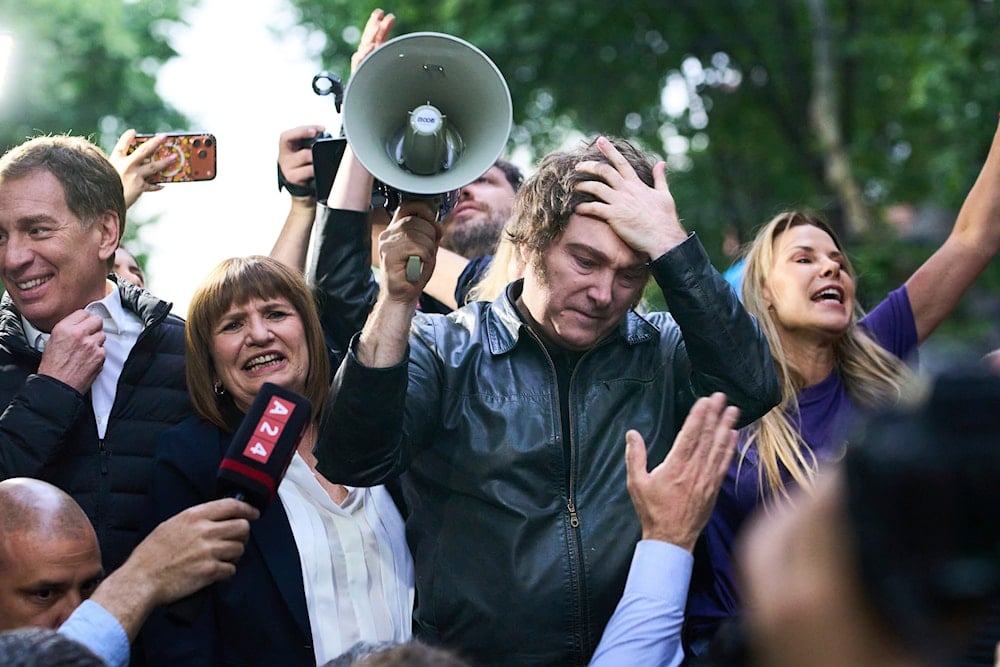Argentina goes to polls amid economic crisis and Trump 'interference'
Argentina’s midterms test President Javier Milei’s mandate amid economic crisis, austerity backlash, and accusations of US interference by Donald Trump.
-

Argentinian President Javier Milei holds a megaphone while leading a campaign rally ahead of mid-term elections, in Tres de Febrero, Buenos Aires province, Argentina, on October 17, 2025. (AP Photo/Rodrigo Abd)
Argentine President Javier Milei is heading into a pivotal moment in his presidency as voters prepare to cast their ballots in Sunday’s midterm elections, two years into his term. The vote comes amid mounting economic hardship and political instability, with critics accusing Milei’s closest foreign ally, US President Donald Trump, of interfering in Argentina’s internal affairs.
Milei, who assumed office in December 2023 on a radical libertarian platform, promised to usher in a "new era of peace and prosperity" by implementing sweeping austerity measures and reining in inflation. While his administration has made progress in curbing triple-digit inflation, Milei’s presidency has been plagued by a wave of challenges in recent months.
Scandals involving close allies, including his sister and chief-of-staff Karina Milei, and an associate linked to alleged drug trafficking, have fueled controversy. A sharp decline in the Argentine peso and rising public anger over austerity have further weakened his political position.
The midterm vote has taken on an international dimension, with Trump, Milei’s most prominent foreign supporter, openly backing the Argentine leader and warning of consequences if he fares poorly. "Argentina is fighting for its life … They are dying," Trump said last week, while hosting Milei at the White House. He further warned that a $40 billion US bailout package could be withdrawn if Milei’s coalition performs poorly: "If he doesn’t win, we’re gone."
The comments have drawn sharp criticism from opposition figures in Argentina, who accuse Trump of overstepping. Itai Hagman, a Peronist economist running for re-election in Buenos Aires, called Trump’s statement "a clear interference in the internal affairs of another country," and accused him of trying to "extort" Argentine voters.
Economic crisis and austerity fuel public discontent
Milei's party, La Libertad Avanza, has already suffered a major blow, losing the recent Buenos Aires provincial election, where 40% of the population resides. In August, the president was pelted with stones during a public appearance, a clear sign of growing frustration with his economic policies.
Public backlash stems largely from Milei’s austerity measures, which have hit workers and the middle class hard. Critics describe his reforms as a "libertarian anarcho-capitalist experiment" that has brought "brutal economic and social suffering." Hagman argued that Milei’s government had effectively "delegated economic management to officials from another country."
Still, government allies are urging patience. "We cannot solve all the problems that the country has had for 100 years in two years," said Gonzalo Roca, a congressional candidate in Córdoba. He insisted the country was "on the right path," but acknowledged the need for "effort and sacrifice."
Political analyst Gustavo Córdoba believes Milei may be punished by voters for failing to deliver tangible improvements in living standards. His polling indicates that 60% of Argentinians cannot make ends meet.
Benjamin Gedan, director of the Latin America program at the Stimson Center, noted that Milei had promised "a period of shared prosperity" in exchange for enduring economic pain. "That really hasn’t materialized," he said.
Gedan warned that a poor result in Sunday’s vote could trigger another run on the peso, possibly spiraling into a broader financial crisis. However, he also predicted a “muddled” outcome that would allow Milei to slightly increase his party’s congressional presence without gaining a clear mandate for deeper reforms.

 4 Min Read
4 Min Read










